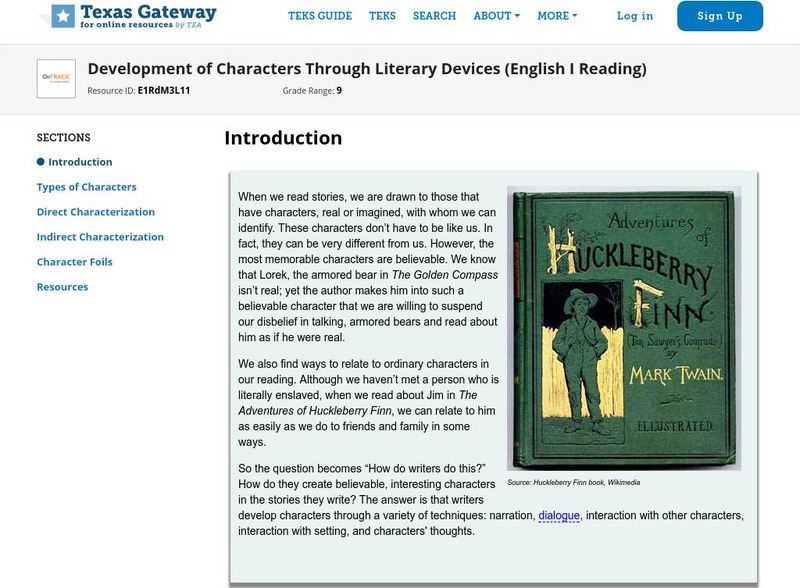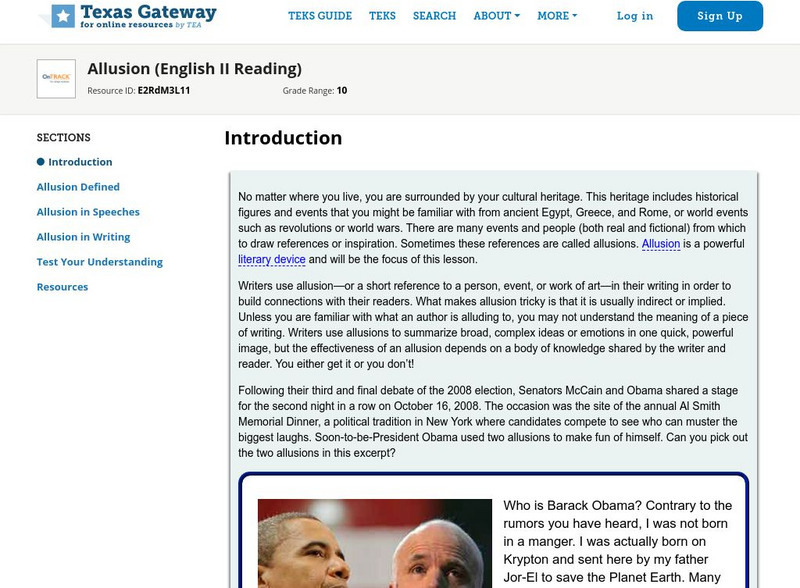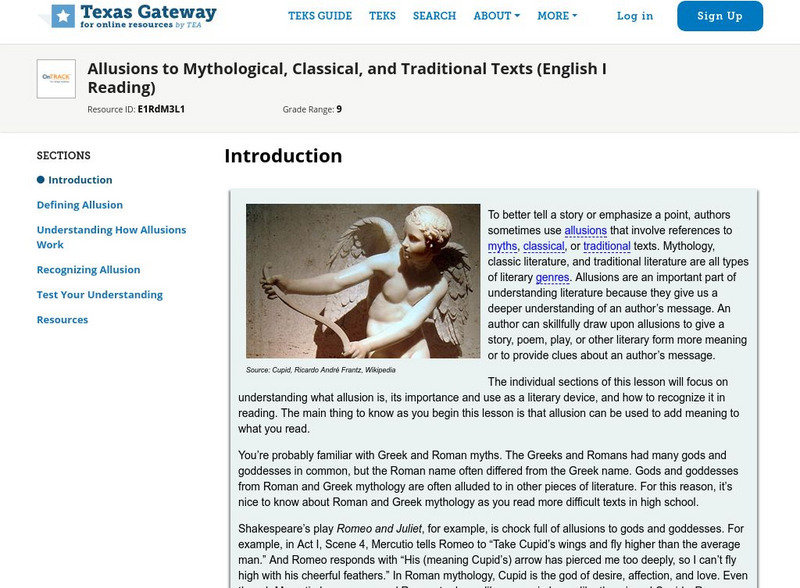Hi, what do you want to do?
Curated OER
Finding Buck Henry
Students read and demonstrate competence in the general skills and strategies of the writing process via the novel "Finding Buck Henry." They recognize complex elements of plot. Students analyze devices used to develop characters in...
Curated OER
Silent Spring
Students read background information about Rachel Carson found on the listed website links. They analyze and answer questions about her work and how it is linked to science then they research pesticide usage and alternative methods.
Curated OER
The Big Blue
Third graders create paper mache globes with balloons. They label the 4 oceans on their balloons with reference to large wall map, classroom globe, and Encarta Virtual Globe CD-ROM projected on large screen TV with Tvator or other...
Curated OER
The Unraveling of a Poem
Students study poetry and poets from different countries and time periods. They analyze various poems, present a dramatic reading of a poem and teach a poem they like to their class.
Curated OER
Bookmaking
Students make and assemble parts of a book, read and respond to classmates' work, read aloud from their own book of poetry. They use the writing process and written language skills, participation in fine arts experiences, appropriate and...
Curated OER
Students as Editors
Students read poems from a variety of authors. They write biographies of each poet and create a book full of the biographies and poems. They share their creation with the class.
Curated OER
The Biomed Unit Project
Students write a persuasive paper following the expository theme format of introduction, first body paragraph, second body paragraph, third body paragraph, and conclusion that addresses the prompt of the final project adequately. They...
Curated OER
Watery World
Students brainstorm to develop resource/reference charts for later use. they are introduced to Microsoft Word and to an internet movie site. They use prepared chart headings, to respond to questions posed on each chart such as: Where do...
Curated OER
"The Tell-Tale Heart" by Edgar Allan Poe
In this "The Tell-Tale Heart" worksheet, students write an essay about how Edgar Allan Poe keeps the reader in suspense. The worksheet helps students construct the essay through eleven different scaffolding steps.
Curated OER
Discussion Questions for Shakespeare's Julius Caeser
Do not let Julius Caesar be Greek to your pupils. Rather, make the play a dish fit for hungry minds. Encourage your class members to lend their ears to a series of rich discussion questions so that they can become masters of the play, as...
Curated OER
Elements of a Short Story
Pupils analyze elements of a short story by working together. In this literature lesson, students analyze short stories. They use the TI Navigator Application to write their findings.
Curated OER
The Hopes of Our Ancestors: The Impact of Immigration on America
Students research the immigration of America. In this American immigration lesson, students complete a unit of activities to learn about American immigration.
Curated OER
M & M Madness
Second graders graph M & M's by color. For this graphing lesson plan, 2nd graders first predict how many of each color they think are in a handful of M & M's. Then they graph the amounts of each color on a computer program....
Curated OER
Evaluating Conclusions
Tenth graders evaluate seven conclusions which use A Doll's House for the prompt response. They develop criteria for writing effective conclusions which respond to an End-of-Course II writing prompt.
Curated OER
Charlotte's Web Venn Diagram
Young scholars, together as a class, construct a Venn diagram of characteristics they see in two classmates. Then, they independently create another Venn diagram comparing/contrasting two characters from the story Charlotte's Web. They...
Texas Education Agency
Texas Gateway: Development of Characters Through Literary Devices
In this lesson, students learn how writers develop characters through a variety of techniques: narration, dialogue, interaction with other characters, interaction with setting, and characters' thoughts. RL.9-10.3 Analyzing Characters,...
Texas Education Agency
Texas Gateway: How to Read and Analyze an Essay (English Iii Reading)
[Accessible by TX Educators. Free Registration/Login Required] In this lesson's activities, you will determine the purpose of description, narration, and exposition essays, analyze their literary devices, and examine text features. You...
Texas Education Agency
Texas Gateway: Development of Characters Through Literary Devices
This lesson focuses on how writers develop characters through a variety of techniques: narration, dialogue, interaction with other characters, interaction with setting, and character's thoughts.
Texas Education Agency
Texas Gateway: Understanding and Analysis of Literary Text: Allusion
A learning module that teaches students about allusion as a literary device in five mini-lessons: Introduction, Allusion Defined, Allusion in Speeches, Allusion in Writing, Test Your Understanding.
Read Works
Read Works: Passages: Forgetting the Words
[Free Registration/Login Required] Students read a fiction text about a boy named Andy who has a part in the school play and answer questions about comprehension, conflict, inferencing, main idea, literary devices, and more. Links to a...
Alabama Learning Exchange
Alex: Soaring With Literary Elements and Devices
In this lesson, students will observe literary elements and devices in a variety of chapter books. Students will be paired with a partner and allowed to choose one book to identify literary elements. Using digital cameras and a computer,...
Texas Education Agency
Texas Gateway: Allusions to Mythological, Classical, and Traditional Texts
[Accessible by TX Educators. Free Registration/Login Required] This lesson focuses on allusions to mythological, classical, and traditional texts and understanding what allusion is, its importance and use as a literary device, and how to...
Texas Education Agency
Texas Gateway: Understatement/overstatement (English I Reading)
A learning module that teaches students to recognize hyperbole and understatement as literary devices in five modules: Introduction, Recognizing Hyperbole and Understanding Its Purpose, Identifying Hyperbole in Poetry, Recognizing...




























